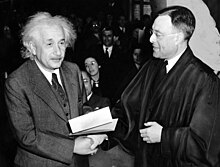Article I, section 8, clause 4 of the United States Constitution expressly gives the United States Congress the power to establish a uniform rule of naturalization. The Immigration and Naturalization Act sets forth the legal requirements for the acquisition of, and divestiture from, citizenship of the United States. The requirements have become more explicit since the ratification of the Fourteenth Amendment to the Constitution, with the most recent changes to statutory law having been made by the United States Congress in 2001.
[edit] Rights and Responsibilities of U.S. Citizens
[edit] Rights of citizens
Adult citizens of the United States who are residents of one of the 50 states have the right to participate in the political system of the United States, as well as their state and local governments (with most states having restrictions on voting by persons convicted of felonies, and a federal constitutional prohibition on naturalized persons running for President and Vice President of the United States), to be represented and protected abroad by the United States (through U.S. embassies and consulates), and to reside in the United States and certain territories without any immigration requirements.
[edit] Responsibilities of citizens
Some[1] U.S. citizens have the obligation to serve in a jury, if selected and legally qualified. Citizens are also required (under the provisions of the Internal Revenue Code) to pay taxes on their total income from all sources worldwide, including income earned abroad while residing abroad. Under certain circumstances, however, U.S. citizens living and working abroad may be able to reduce or eliminate their U.S. federal income tax via the Foreign Earned Income Exclusion and/or the Foreign Tax Credit.[2] U.S. taxes payable may be alternatively reduced by credits for foreign income taxes regardless of the length of stay abroad. The United States Government also insists that U.S. citizens travel into and out of the United States on a U.S. passport, regardless of any other nationality they may possess.
Male U.S. citizens (including those living permanently abroad and/or with dual U.S./other citizenship) are required to register with the Selective Service System at age 18 for possible conscription into the armed forces. Although no one has been drafted in the U.S. since 1973, draft registration continues for possible reinstatement on some future date.[3]
In the Oath of Citizenship, immigrants becoming naturalized U.S. citizens swear that when required by law they will bear arms on behalf of the United States, will perform noncombatant service in the U.S. Armed Forces, and will perform work of national importance under civilian direction. In some cases, the USCIS allows the oath to be taken without the clauses regarding the first two of these three sworn commitments.[4]
[edit] Acquisition of citizenship
There are various ways a person can acquire United States citizenship, either at birth or later on in life.
[edit] Naturalization
A person who was not born a U.S. citizen may acquire U.S. citizenship through a process known as naturalization.
[edit] Eligibility for naturalization
To become a naturalized United States citizen, one must be at least eighteen years of age at the time of filing, a legal permanent resident of the United States, and have had a status of a legal permanent resident in the United States for five years less 90 days before they apply (this requirement is reduced to three years less 90 days if they (a) acquired legal permanent resident status, (b) have been married to and living with a citizen for the past three years and (c) the spouse has been a U.S. citizen for at least three years prior to the applicant applying for naturalization.) They must have been physically present for at least 30 months of 60 months prior to the date of filing their application. Also during those 60 months if the legal permanent resident was outside of the U.S. for a continuous period of 6 months or more they are disqualified from naturalizing (certain exceptions apply for those continuous periods of six months to 1 year). They must be a "person of good moral character", and must pass a test on United States history and government[9][10] Most applicants must also have a working knowledge of the English language.[9] There are exceptions, introduced in 1990, for long-resident older applicants and those with mental or physical disabilities.[11][12]
[edit] Citizenship test
Applicants for citizenship are asked ten questions, and must answer at least six with the expected answers. U.S. Citizenship and Immigration Services has published a list of 100 sample questions (with the answers that should be given when taking the test), from which the questions asked are always drawn. The full list of questions is in the "A Guide to Naturalization," available for free from the USCIS.[13]
[edit] New naturalization test and interview
There is a new naturalization test that is being used for all N-400 applications filed on or after October 1, 2008.[14] If the applicant filed the N-400 application before October 1, 2008 then the applicant may choose to take the new test or the old test. The new test examines the applicant's knowledge of American society and the English language. Sample questions and answers are published by the USCIS in English, Spanish, Chinese, Tagalog, and Vietnamese.[15]
Besides passing the citizenship test: citizenship applicants must also satisfy other specific requirements of naturalization to successfully obtain U.S. citizenship.[16]
An applicant will also be required to submit to an in-person interview.
[edit] Eligibility for public office
A person who becomes a U.S. citizen through naturalization is not considered a natural born citizen. Consequently, naturalized U.S. citizens are not eligible to become President of the United States or Vice President of the United States, which would ordinarily be the case as established by the Presidential Succession Act. For example, though the Secretary of Commerce and the Secretary of Labor are tenth and eleventh in the presidential line of succession, Elaine Chao and Carlos Gutierrez (respectively former U.S. Secretaries of Labor and Commerce under President George W. Bush) would have been unable to succeed to the presidency because they became U.S. citizens through naturalization. The highest-ranking naturalized citizens to have been excluded from the Presidential Line of Succession were Henry Kissinger and Madeleine Albright, each of whom would have been fourth in line as Secretary of State had they been natural born citizens.
Whether this restriction applies to children born to non-U.S. citizens but adopted as minors by U.S. citizens is a matter of some debate, since the Child Citizenship Act of 2000 is ambiguous as to whether acquisition of citizenship by that route is to be regarded as naturalized or natural-born. Those who argue that the restriction does not apply point out that the child automatically becomes a citizen even though violating every single requirement of eligibility for naturalization, and thus the case falls closer to the situation of birth abroad to U.S. citizens than to naturalization. This interpretation is in concert with the wording of the Naturalization Act of 1790, that "the children of citizens of the United States that may be born beyond the sea, or out of the limits of the United States, shall be considered as natural born citizens", which does not draw a distinction between biological children and adopted children, even though the process of adoption was certainly well known at the time.
Some argue that the phrase "natural born citizen" describes a category of citizenship distinct from that described by the phrase "U.S. Citizen" in Article Two of the United States Constitution, and this was discussed during the constitutional convention of 1787.[17] While it is true that "natural born citizen" is not defined anywhere within the text of the Constitution and that the Constitution makes use of the phrase "citizen" and "natural born citizen," Supreme Court Decisions from United States v. Wong Kim Ark to the present have considered the distinction to be between natural-born and naturalized citizenship.
Most legal scholars believe that the phrase "natural born citizen" is derived from the works of William Blackstone and depends on the legal doctrine of Jus soli. For example, in her 1988 article in the Yale Law Journal, Jill Pryor wrote, "It is well settled that 'native-born' citizens, those born in the United States, qualify as natural born."[18]
An April 2000 CRS report by the Congressional Research Service, asserts that most constitutional scholars interpret the phrase "natural born citizen" as including citizens born outside the United States to parents who are U.S. citizens under the "natural born" requirement.[19]
Chester Arthur (born of an American mother and Irish father, purported birthplace of Canada) was sworn in as President, however his status as a "Natural born citizen" was challenged because he was born with British citizenship [20] (therefore not jus sanguinis) and it is contended, on foreign soil (therefore not jus soli). Some argue that those born abroad to U.S. citizens are not eligible to ascend to the Presidency (not jus soli), since an act of the United States Congress such as the Naturalization Act may not overrule the Constitution (see "Natural born citizen" as presidential qualification).[21] Presidential candidates George W. Romney (born in Mexico), Barry Goldwater and John McCain (born in U.S. territories), were never seriously challenged on the basis of their "natural born" citizenship, but no candidate falling under this classification has ever actually become President.
[edit] Dual citizenship

Based on the U.S. Department of State regulation on dual citizenship (7 FAM 1162), the Supreme Court of the United States has stated that dual citizenship is a "status long recognized in the law" and that "a person may have and exercise rights of nationality in two countries and be subject to the responsibilities of both. The mere fact he asserts the rights of one citizenship does not without more mean that he renounces the other," (Kawakita v. U.S., 343 U.S. 717) (1952). In Schneider v. Rusk 377 U.S. 163 (1964), the US Supreme Court ruled that a naturalized U.S. citizen has the right to return to his native country and to resume his former citizenship, and also to remain a U.S. citizen even if he never returns to the United States.
The Immigration and Nationality Act (INA) neither defines dual citizenship nor takes a position for it or against it. There has been no prohibition against dual citizenship, but some provisions of the INA and earlier U.S. nationality laws were designed to reduce situations in which dual citizenship exists. Although naturalizing citizens are required to undertake an oath renouncing previous allegiances, the oath has never been enforced to require the actual termination of original citizenship.[24]
Although the U.S. Government does not endorse dual citizenship as a matter of policy, it recognizes the existence of dual citizenship and completely tolerates the maintenance of multiple citizenship by U.S. citizens. In the past, claims of other countries on dual-national U.S. citizens sometimes placed them in situations where their obligations to one country were in conflict with the laws of the other. However, as fewer countries require military service and most base other obligations, such as the payment of taxes, on residence and not citizenship, these conflicts have become less frequent. As a result, there has been a dramatic increase in recent years in the number of people who maintain U.S. citizenship in other countries.
One circumstance where dual citizenship may run counter to expectations of government agencies is in matters of security clearance. Any person granted a Yankee White vetting must be absolutely free of foreign influence, and for other security clearances one of the grounds that may result in a rejected application is an actual or potential conflict of national allegiances.


No comments:
Post a Comment